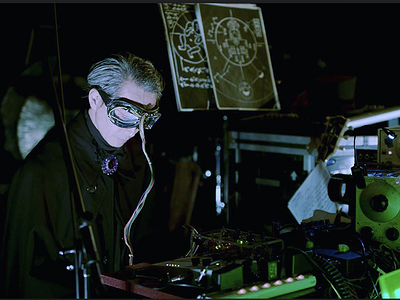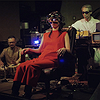Name: Masaki Batoh
Nationality: Japanese
Occupation: musician / accupuncturist
Current Release: an evening with nehan on Drag City
Recommendations: Grow plants and vegetables and take care of the garden /Love each other and heal others.
If you enjoyed this interview with Masaki Batoh and would like to find out more about him, visit his artist profile on the Drag City website.
Do you think that some of your earliest musical experiences planted a seed for your interest in improvisation?
Absolutely, yes. In the very beginning of our (Ghost) activities we really didn’t know what we should do. With musical instruments or without, the only thing demanded was pure eternity. To be nothingness. We tried to get pure improved spiritual communication by awakened brains - we wished! We were too young to understand the higher order of music, but at least we were very seriously struggling to learn what pure improvisation could be.
Initially we found some of my father’s 2-track, open reel analogue tapes in the factory, on which were original Buddhist chanting. So we cut them into pieces and put them back together randomly. Then we made some loops so they repeated for a few seconds. We found other instruments, electric monster toys with sound effects, electronic calculators, any beep-sounding machines in fact. We also found metal useful for percussion in the junkyard - bedspring, coils, metal plates etc. We thought these were incredible discoveries, but soon realised that SO many modern music composers, psychedelic musicians and industrial artists had tried these ideas a lot already! We were highly dissatisfied to find that tape looping had been done even in the early ‘60s, by Stockhausen for example.
When did you first consciously start getting interested in musical improvisation? Which artists, teachers, albums or performances involving prominent use of improvisation captured your imagination in the beginning?
It was lucky that we had learned from many music improvisers, mostly Free Jazz players, around us. Japanese of course, US and European records too. Many great performers we respected, for example Patty Waters, Albert Ayler, Coltrane, Milford Graves, Miles, Dolphy, Masahiko Togashi, Kaoru Abe Etc.
Tell me about your instrument and/or tools, please. What made you seek it out, what makes it “your” instrument, and what are some of the most important aspects of playing it?
My main instrument is acoustic guitar 6&12 strings, both are my comrades. Also, banjo is necessary. I made my own strange instruments by myself too, for example Giri Giri Pee, Unari yumi, Springer, Birds box etc. But my best device is Brain Pulse Machine. This is the best improvisational tool, ideally because this denies humans intentions.
How would you describe your own relationship with your instrument – is it an extension of your self/body, a partner and companion, a creative catalyst, a challenge to be overcome, something else entirely?
This is very interesting question. In my case, honestly, guitar isn’t the best tool to improvise. Probably any instruments are not the best for me, and my voice, likewise. Humans have always studied musical methodologies, such as guitar fingering techniques, that contain habitual expressions, but it’s unconsciously tracing empirical studies. This often happens more for professional musicians, but is does not have to be inescapable.
So far, the Brain Pulse Machine hasn’t betrayed us. By austere training, anyone can improvise music. Moreover, pure natural expression can be born naturally by our EGG with BPM (Brain Pulse Machine). It’s our supernatural tool to get out of the “prison of the body”.
Derek Bailey defined improvising as the search for material which is endlessly transformable. What kind of materials have turned to be particularly transformable and stimulating for you?
Definition of improvisation is nothing but a metaphysical escape from our natural body’s feedbacks. Transformation - many pieces of our cells recall different new structures. Materialistic thought should be gone soon. We’d be better off within nothingness.
Do you feel as though there are at least elements of composition and improvisation which are entirely unique to each? Based on your own work or maybe performances or recordings by other artists, do you feel that there are results which could only have happened through one of them?
I don’t know. This is non-universal idea but, I my case, my composition can’t be constructed completely, it’s always half designed. Put another way, it’s half deconstructed. It can become music when complemented by another player’s improvising, by myself or other players. You may hear a very strange beat, or one beat missing in tunes sometimes, but this is natural for me.
When you're improvising, does it actually feel like you're inventing something on the spot – or are you inventively re-arranging patterns from preparations, practise or previous performances? What balance is there between forgetting and remembering in your work?
“Get out of prison of our body”
We finally found a supernatural method. Eternity is just a moment. You will learn this in our performance.
Are you acting out parts of your personality in your improvisations which you couldn't or wouldn't through other musical approaches? If so, which are these? What, would you say, are the key ideas behind your approach to improvisation?
I play music as if breathing air, or like talking or sleeping, I am not a special creature.
In terms of your personal expression and the experience of performance, how does playing solo compare to group improvisations?
Thank you. My solo performance is like a journey into my spirit. It’s a private exploration like an Indian ink painting. On the other hand, the group’s expressions are communicative interactions, similar to combining threads in a weave to make a colourful fabric.
In your best improvisations, do you feel a strong sense of personal presence or do you (or your ego) “disappear”?
Nothingness.
In a live situation, decisions between creatives often work without words. From your experience and current projects, what does this process feel like and how does it work?
nehan my newest project is like undercurrent. It’s a silent stream of our notes. In my consciousness, every nehan performance feels like only a moment. Very smooth and enthusiastic.
Stewart Copeland said: “Listening is where the cool stuff comes from. And that listening thing, magically, turns all of your chops into gold.” What do you listen for?
Yes I agree with Stewart. Since my sense is mainly that of an old listener. Sitting on a single sofa in front of JBL big speakers, driven by McIntosh amplifiers and playing a record or sometimes open reel tape recorders. Listening to records is really fun.
There can be surprising moments during improvisations – from one of the performers not playing a single note to another shaking up a quiet section with an outburst of noise. Have you been part of similar situations and how did they impact the performance from your point of view?
I’m not sure what they are. Music is harmony. Just a journey in heaven & hell and maybe a spiritual awakening way.
I have always been fascinated by the many facets of improvisation but sometimes found it hard to follow them as a listener. Do you have some recommendations for “how to listen” in this regard?
I guess you’re an honest person who feels sympathy for musicians and also feel responsibility to keep on listening patiently. But it’s worthless. Let your spirit enjoy the freedom around music chanting. Stand close to the favourite atmosphere. Leave spineless boredoms. Freedom.





